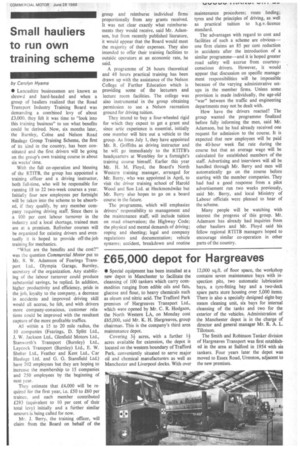Small hauliers to run own training scheme
Page 31

If you've noticed an error in this article please click here to report it so we can fix it.
by Carolyn Hyams
• Lancashire businessmen are known as shrewd and hard-headed and when a group of hauliers realized that the Road Transport Industry Training Board was demanding a combined levy of about £3,000, they felt it was time to "look into this training business" to see what benefits could be derived. Now, six months later, the Burnley, Colne and Nelson Road Haulage Group Training Scheme, the first of its kind in the country, has been constituted and the first drivers Will be going on the group's own training course in about six weeks' time.
With the full co-operation and blessing of the RTITB, the group has appointed a training officer and a driving instructor, both full-time, who will be responsible for running 18 to 22 two-week courses a year. Initially four new employees per fortnight will be taken into the scheme to be absorbed, if they qualify, by any member company requiring driving staff. Since there is a 100 per cent labour turnover in the industry and a local shortage, trained men are at a premium. Refresher courses will be organized for existing drivers and eventually it is hoped to provide off-the-job training for mechanics.
"What are the benefits and the cost?" was the question Commercial Motor put to Mr. B. W. Adamson of Fearings Transport Ltd., Olympia Garage, Burnley, secretary of the organization. Any stabilizing of the labour turnover could produce substantial savings, he replied. In addition, higher productivity and efficiency, pride in the job, loyalty to the company, a decrease in accidents and improved driving skill would all accrue, he felt, and with drivers more company-conscious, customer reladons could be improved with the resultant capture of the more profitable traffics.
All within a 15 to 20 mile radius, the 10 companies (Fearings, D. Splitt Ltd., J. W. Jackson Ltd., Glenfield Motors Ltd., Stanworth's Transport (Burnley) Ltd., Laycock Transport (Burnley) Ltd., E. W. Shelter Ltd., Feather and Kent Ltd., Car Haulage Ltd. and G. G. Stansfield Ltd.) have 202 employees but they are hoping to increase the membership to 15 companies and 250 employees by the beginning of next year.
They estimate that £4,000 will be required for the first year, i.e. £50 to £60 per trainee, and each member contributed £293 (equivalent to 10 per cent of their total levy) initially and a further similar amount is being called for now.
Mr. J. Berry, the training officer, will claim from the Board on behalf of the group and reimburse individual firms proportionally from any grants received. It was not clear exactly what reimbursements they would receive, said Mr. Adamson, but from recently published literature, it would appear that the Board would meet the majority of their expenses. They also intended to offer their training facilities to outside operators at an economic rate, he said.
A programme of 26 hours theoretical and 48 hours practical training has been drawn up with the assistance of the Nelson College of Further Education which is providing some of the lecturers and lecture room facilities. The college was also instrumental in the group obtaining permission to use a Nelson recreation ground for driving tuition.
They intend to buy a four-wheeled rigid for which they expect to get a grant and since artic experience is essential, initially one member will hire out a vehicle to the group. As from July 1, they have appointed Mr. R. Griffiths as driving instructor and he will go immediately to the RTITB's headquarters at Wembley for a fortnight's training course himself. Earlier this year Mr. H. M. Floyd, the Board's North Western training manager, arranged for Mr. Berry, who was appointed in April, to visit the driver training school of Harold Wood and Son Ltd. at Heckmondwike but Mr. Berry also hopes to go on a board course in the future.
The programme, which will emphasize drivers' responsibility to management and the maintenance staff, will include tuition on road observation; the Highway code; the physical and mental demands of driving; roping and sheeting; legal and company regulations and documentation; vehicle systems; accident, breakdown and routine maintenance procedures; route finding; tyres and the principles of driving, as well as practical tuition to h.g.v.-licence standard.
The advantages with regard to cost and facilities of such a scheme are obvious— one firm claims an 85 per cent reduction in accidents after the introduction of a similar programme—and it is hoped greater road safety will accrue from courtesyconscious drivers. However, it would appear that discussion on specific management responsibilities will be impossible because of the varying administrative setups in the member firms. Unless some provision is made individually, the age-old "war" between the traffic and engineering departments may not be dealt with.
How have the drivers reacted? The group wanted the programme finalized before fully informing the men, said Mr. Adamson, but he had already received one request for admission to the course. It is expected that new employees will be paid the 40-hour week flat rate during the course but that an average wage will be calculated for established members of the staff. Advertising and interviews will all be handled through Mr. Berry and men will automatically go on the course before starting with the member companies. They had had a good response from a pilot advertisement run two weeks previously, said Mr. Berry, and local Ministry of Labour officials were pleased to hear of the scheme.
Many people will be watching with interest the progress of this group. Mr. Adamson has already had inquiries from other hauliers and Mr. Floyd said his fellow regional RTITB managers hoped to encourage similar co-operation in other parts of the country.
























































































































